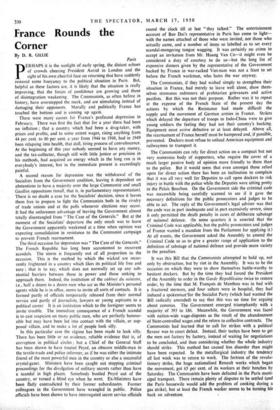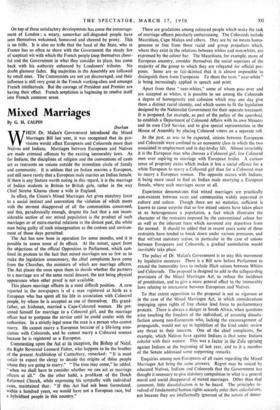France Rounds the Corner
By D. R. GILLIE
Paris
pERHAPS it is the sunlight of early spring, the distant echoes of crowds cheering President Auriol in London and the sight of his own cheerful face on returning that have suddenly restored some buoyancy to the political situation in Paris. But, helpful as these factors are, it is likely that the situation is really improving, that the forces of confidence are growing and those of disintegration weakening. The Communists, as often before in history, have overstepped the mark, and are stimulating instead of damaging their opponents. Morally and politically France has touched the bottom and is coming up again.
There were many causes for France's profound depression in February. There was first the fact that for a year there had been no inflation ; that a country which had been a drug-taker, with prices and profits, and to some extent wages, rising anything from 44 per cent. to 80 per cent. a year from 1944 to 1948, had in 1949 been relapsing into health, that dull, tiring process of convalescence. At the beginning of this year nobody seemed to have any money, and the tax-collector, though still with little justice or precision in his methods, had acquired an energy which in the long run is in everybody's interest, but in the immediate present is exceedingly painful.
A second reason for depression was the withdrawal of the Socialists from the Government coalition, leaving it dependent on abstentions to have a majority over the large Communist and small Gaullist oppositions (small, that is, in parliamentary representation). There is no doubt a case for the Socialists' decision, since it leaves them free to prepare to fight the Communists both in the rivalry of trade unions and at the polls whenever elections may occur. It had the unforeseen advantage of leaving the Government almost totally disentangled from " The Case of the Generals." But at the moment of the Socialists' departure the only result was to leave the Government apparently weakened at a time when opinion was expecting consolidation in resistance to the Communist campaign to prevent French rearmament.
The third occasion for depression was " The Case of the Generals." The French Republic has long been accustomed to recurrent scandals. The storm is frequently out of all proportion to the occasion. This is the method by which the wicked are recur- rently frightened in a country which likes its political life free and easy ; that is to say, which does not normally set up any sub- stantial barriers between those in power and those seeking to approach them. Indeed, the institution of the cabinet du ministre, i.e., half a dozen to a dozen men who act as the Minister's personal agents while he is in office, seems to invite all sorts of contacts. It is formed partly of officials temporarily released from their normal service and partly of journalists, lawyers or young aspirants to a political career. It is an institution which to the foreigner seems to invite trouble. The immediate consequence of a French scandal is to cast suspicion on many public men, who are perfectly honour- able but may have been led into contact with the villain, or sup- posed villain, and to make a lot of people look silly.
In this particular case the regime has been made to look silly. There has been little or no evidence, reliable evidence that is, of corruption in political circles ; but a Chief of the General Staff has been shown to have treated Peyri, an obscure middle-man in the textile-trade and police informer, as if he was either the intimate friend of the most powerful men in the country or else a successful crystal-gazer. Ministers have been caught out stopping criminal proceedings for the divulgation of military secrets rather than have a scandal in high places. Somebody bustled Peyre out of the country, or turned a blind eye when he went. Ex-Ministers have been flatly contradicted by their former subordinates. Former colleagues in the Government have wrangled in public. Police officials have been shown to have interrogated secret service officials round the clock till at last " they talked." The entertainment account of Bao Dai's representative in Paris has come to light— with the names attached of those who were invited, not those who actually came, and a number of items so labelled as to set every scandal-mongering tongue wagging. It was certainly no crime to accept an invitation from Mr. Hoang Van Co—it might even be considered a duty of courtesy to do so—but the long list of expensive dinners given by the representative of the Government backed by France in war-racked Viet-nam was not a feast to set before the French workman, who hates the war anyway.
The Communists, if they had wished simply to strengthen their situation in France, had merely to leave well alone, show them- selves strenuous redressers of proletarian grievances and active pacifists. But this was not their purpose. Rather was it to repeat at the expense of the French State of the present day the actions by which the Resistance had made difficult the supply and the movement of German armies in France. Strikes which delayed the departure of troops to Indo-China were to give young soldiers the feeling they had not their country's backing. Equipment must arrive defective or at least delayed. Above all, the rearmament of France herself must be hampered and, if possible, prevented. Dockers must refuse to unload American equipment and railwaymen to transport it.
The Communists can rely for direct action on a compact but not very numerous body of supporters, who require the cover of a much larger passive body of opinion more friendly to them than to the police. But it would seem that even amongst those relied upon for direct action there has been an inclination to complain that it was all very well for Deputies to call upon dockers to risk injury in battle with the police while the Deputies were sitting pretty in the Palais Bourbon. On the Government side the criminal code was meanwhile being carefully scanned to see if it gave the necessary definitions for the public prosecutors and judges to be able to act. The reply of the Government's legal adviser was that the code was in part inadequate and in part excessively severe, since it only permitted the death penalty in cases of deliberate sabotage of national defence. (In some quarters it is asserted that the Criminal Code was applicable, but the public prosecutors and judges of France wanted a mandate from the Parliament for applying it.) At all events, the Government asked the Assembly to amend the Criminal Code so as to give a greater range of application to the definition of sabotage of national defence and provide more variety in the penalties.
It was this Bill that the Communists attempted to hold up, not only by obstruction, but by riot in the Assembly. It was to be the occasion on which they were to show themselves battle-worthy to hesitant dockers. But by the time they had forced the President of the Assembly to order in the Garde Republicaine twice to restore order, by the time that M. Francois de Menthou was in bed with a fractured sternum, and four ushers were in hospital, they had induced a spokesman for the Socialist Party (which had wanted the Bill radically amended) to say that this was no time for arguing about commas. The Government emerged triumphantly with a majority of 393 to 186. Meanwhile, the Government was faced with nation-wide wage-disputes as the result of the abandonment of State-controlled wages and the return to collective contracts. The Communists had learned that to call for strikes with a political flavour was to court defeat. Instead, their tactics have been to get the men out factory by factory, instead of waiting for negotiations to be concluded, and then considering whether the whole industry should strike. This method has caused less disorder than might have been expected. In the metallurgical industry the tendency all last week was to return to work. The fortress of the revolu- tionary strike, the huge nationalised Renault works which began the movement, got 65 per cent. of its workers at their benches by Saturday. The Communists have been defeated in the Paris muni- cipal transport. There remain plenty of disputes to be settled (and the Paris housewife would add the problem of cooking during a gas strike), but at least the French worker seems to be turning his back on adventure.
On top of these satisfactory developments has come the encourage- ment of LohdOn ; a weary, somewhat self-disgusted people have seen themselves welcomed, honoured and cheered by proxy. This is no trifle. It is also no trifle that the head of the State, who in France has so often to share with the Government the steady fire of sceptical wit with which the French people keep themselves cheer- ful and the Government in what they consider its place, has come back with his authority enhanced by Londoners' tributes. No doubt glamour fades. Big majorities in the Assembly are followed by small ones. The Communists are not yet discouraged, and their influence is still very great in the French working-class and amongst French intellectuals. But the courage of President and Premier are having their effect. French scepticism is beginning to resolve itself into French common sense.



































 Previous page
Previous page